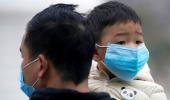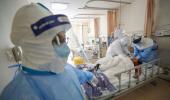China said on Monday that a group of experts from the World Health Organization will arrive in the country on Thursday for a long-anticipated probe into the origins of the coronavirus pandemic, ending the uncertainty and delay which drew sharp criticism from the world health body.

Experts from the WHO will conduct a field visit to China on January 14, the state-run CGTN quoted China's National Health Commission as saying in a report.
Confirming the visit, Chinese foreign ministry spokesman Zhao Lijian told a media briefing on Monday that China supported scientists around the world to conduct a global study on the origins and transmission routes of the virus.
Zhao declined to provide details of the schedule of the experts and whether they would be permitted to visit the Wuhan Institute of Virology.
US President Donald Trump, who has termed coronavirus “China virus”, has alleged that the virus may have emanated from WIV and called for a probe into it.
WIV has denied the allegation, saying it is politically motivated.
The ten-member team of WHO experts is expected to visit Wuhan, but it is not clear yet whether they would visit WIV too.
When asked about it, Zhao directed the questions relating to the schedule of the WHO experts to relevant authorities.
"China stands ready to closely cooperate with WHO and international experts. With specific details of itinerary, I refer to you to competent authority,” he said.
"The origin tracing may involve more countries. The WHO needs to conduct similar studies in other countries and regions," Zhao said, highlighting Chinese Foreign Minister Wang Yi's recent comments that China "raced against time" and was the first country to report coronavirus cases to the world.
“More and more research suggests that the pandemic was likely to have been caused by separate outbreaks in multiple places in the world,” he said.
The team's visit to China, especially to Wuhan where the virus first emerged in December last year, has become a bone of contention as Beijing, which questions the widely-held view about the virus' origins in Wuhan, had delayed granting permission to the 10-member team of experts.
China has been proactively questioning the view that the deadly outbreak took place in a wet market in Wuhan where live animals, birds and reptiles are sold and spread to humans. The market remained closed and sealed since early last year.
Monday's confirmation came after WHO chief Tedros Adhanom Ghebreyesus, who is often accused of being pro-China, in a rare instance of criticism, expressed disappointment over Beijing for not finalising the necessary permissions for the experts' team's arrival.
"I'm very disappointed with this news, given that two members had already begun their journeys and others were not able to travel at the last minute, but had been in contact with senior Chinese officials," he said.
Tedros said he "made it clear" that the mission was a priority for the UN health agency and it was eager to get it "underway as soon as possible".
The delay by China to finalise the visit fuelled concerns that Beijing was obstructing global efforts to trace the origins of COVID-19.
China and the World Health Organization have reached a consensus on specific arrangements of the investigation with four video conferences, said Zeng Yixin, the deputy head of the National Health Commission.
On January 9, Zeng told the media here that China and the WHO had reached a consensus on specific arrangements of the investigation with four video conferences.
Once the WHO experts complete their procedures and finalise the schedule, Chinese experts will go to Wuhan with them to conduct the investigation, Zeng said.
The experts team was also expected to undergo 14-day quarantine.
In May last year, the World Health Assembly -- the governing body of the 194-member states of the WHO -- approved a resolution to set up an independent inquiry to conduct an "impartial, independent and comprehensive evaluation" of the international response, as well as that of the WHO.
It also asked the WHO to investigate the "source of the virus and the route of introduction to the human population".










